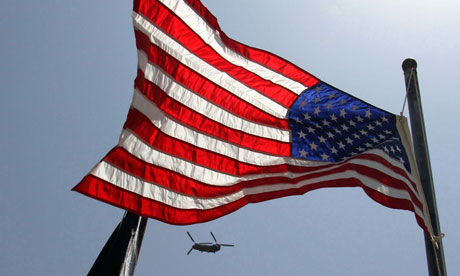It has been a bad week for the United States, or at least for its government and the chief executive, Barack Obama. Commentators have been quick to discern evidence of a structural, even fatal erosion of American power. This is a favourite pastime for prognosticators and pontificators everywhere. It is often tinged with wishful thinking and anti-Americanism. But this time, could the Gibbonesque decline and fall narrative be true?
The rudest shock came with the gratuitous downgrading of Washington's triple-A credit rating after the unsatisfactory congressional compromise over federal debt reduction. This did not mean much to the man in the street. But when China, self-appointed heir to America's sole superpower status, sternly chastised Washington's wanton fecklessness, the political significance of the near-default became clearer.
The Chinese want it both ways, of course: to keep selling to America (and financing its export purchases), thus building national strength, while mostly dodging the global responsibilities – financial, military and geostrategic – of great power status. That Beijing felt able to level such sharp criticism showed how far the balance of advantage has shifted.
These developments led Washington Post columnist EJ Dionne to declare mournfully: "The first week of August 2011 will be remembered as a singularly irrational, wasteful and shameful moment in the political and economic history of the United States ...
"In our fixation with a deeply ideological debate over government spending, we have lost track of what really matters. Washington, acting in concert with other nations, should be focused on creating jobs and restoring growth ... The central question is whether the United States is still capable of leading the world out of economic turmoil."
A second, cruel blow to American self-esteem came with the shooting down by the Taliban of a US Chinook helicopter in Afghanistan. Thirty navy seals, including members of the Team 6 unit that took out Osama bin Laden, were killed – the biggest single American loss of life in Afghanistan since the invasion of 2001.
This tragedy was more than merely human. It starkly contradicted Obama's preferred Afghan storyline, namely that the US is winning, the Taliban are on the back foot, troop withdrawals can proceed, and Afghan forces and politicians are ready to take over running their country. This in turn undermined the self-perpetuated myth of military invincibility at the root of US power.
Juliette Kayyem, writing in the Boston Globe, said the crash "holds a mirror up to the war itself and exposes the fallacy that we can leave Afghanistan on our own terms ... We had come to believe that whatever would happen to Afghanistan in the future, that we could exit gracefully, with our heads held high even if we were also holding our noses ...
"Saturday's events suggest that whether we leave this year, next year, or in 2014, we won't be able to control what happens afterward, any more than we can control the rocket-propelled grenades that so easily bring down Chinook helicopters."
Obama's third strike-out was delivered by President Bashar al-Assad. Even as the US was decrying the repression of Syria's popular uprising, the Damascus regime was intensifying the crackdown. With about 300 dead and rising, the past week has been the bloodiest since the revolt began in March.
Syria's disdain for American strictures illustrated a bigger problem: the decline in US influence across the Middle East, evidenced by its failure to produce a coherent response to the Arab spring, the failure of its Israel-Palestine peacemaking efforts, the failure to halt Iran's suspect nuclear activities, and the sorry, foot-dragging end to its Iraq adventure. Obama's 2009 Cairo speech promised support for democratic change in the Arab world. The chance unexpectedly came, starting in Tunisia. But he didn't show up.
So is the US all washed up as a global leader? Not really. Doug Saunders, in Canada's Globe and Mail, summed up the true believers' case: It had certainly been a bad week, he said. "Once again it's autumn in America ... We have given up on the United States, by default, because the United States appears to have given up on itself. Or so we keep repeating. It's become a cliché.
"Yes, the US is sick. Very, very sick, with little chance of recovery in the foreseeable future. But, despite all that, it would be premature and unprofessional to declare the illness terminal."
The survival and revival power of the US economy, and US treasury securities in particular, he said, remained the safest bet in an uncertain world. American military and diplomatic clout, despite cutbacks, remained unmatched. And US politicians usually did the right thing in the end, despite themselves, because Americans insisted they should.
Saunders concluded: "At some point, the US will become 'just another country', like Britain, its sterling-and-empire days behind it. To a certain sort of flag-waver, and to a certain sort of anti-American, that will be as good as death. But given this patient's habit of leaping up from the mortuary slab, I wouldn't put pennies on its eyes quite yet."






